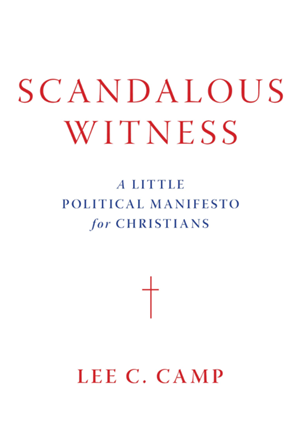Not Left, Not Right, and Not Religious

I believe it was G.K. Chesterton who said something like this: Christianity’s problem is not that it has tried and failed but that it has never been tried. I don’t know where, but one of our readers can point us to the citation. What matters more here is that his idea is close to what my friend Lee Camp is forcefully contending for in his wonderful new book Scandalous Witness.
The problem with Progressives is that they are blinded to the partisanship of their claims. The problem with Conservatives is that they are blinded to the partisanship of their claims. Both are insufferable. And blinded. When Jesus is always on your side you are blind to the real Jesus. He doesn’t square up with you or anyone else. He is more For-Us than we are ourselves, and he’s more Against-Us than we could ever imagine.
Most An baptists I run into today are just Jesus-Progressives. They wrangled Jesus into covering their partisan stances. I say the same about GOP Evangelicals. They’d like to think they’ve got Jesus on their side. He’s not. Until he’s in your face a bit you’re not talking to the Jesus of the Gospels. Nobody wants to die to themselves the way Jesus did or the way Jesus wants us to.
So there. We need to start right there.
Which is why I like the equal opportunity critic, Lee Camp. Take this for example:
We must deconstruct our own paltry notions about what Christianity itself is and come anew to the conviction that Christianity is not a religion. It is a politic. Tragically few people-including the majority of Christians, whether liberal or conservative, recognize Christianity as a politic. I am not suggesting the more palatable notion merely that Christianity has political implications. I am suggesting that it is itself a politic, which has an all-encompassing vision of human history.

Christianity is a politics, it is not a political influence theory. It is something else.
While more will be said later, suffice it here simply to say that by politic I mean an all-encompassing manner of communal life that grapples with all the questions the classical art of politics has always asked: How do we live together? How do we deal with offenses? How do we deal with money? How do we deal with enemies and violence? How do we arrange marriage and families and social structures? How is authority mediated, employed, ordered? How do we rightfully order passions and appetites? And much more besides, but most especially add these: Where is human history headed? What does it mean to be human? And what does it look like to live in a rightly ordered human community that engenders flourishing, justice, and the peace of God?
Partisanship, which is indicated by the number of FB posts you have that indicate with party you are against or which party you are for, or which pretends to be objective about it all but which is obvious to everyone else that you’ve taken a side.
Partisanship is imperialism. All the way down.
The problems with imperialist instances of Christian practice is not not that they understand Christianity to be inherently political. They are wrong in allying themselves with coercive political means and such means conjoined with national or imperial borders and identities. By doing so they subvert the genius of the Jesus for whom the love of God is radically free and radically gracious, making possible (a) the political possibility that rejection and loss may be hallmarks of the kingdom of God, until the kingdom comes in fullness, but also (b) the political possibility that unfathomable and as yet unimagined possibilities are made possible by the resurrecting power of God, even before the king-dom comes in all its fullness.
He turns then to Jesus – his testings, his temptations, his life and mission – whatever you want to call the mix, and he sorts out the options:
Jesus Was Tempted to Take Up the Way of MAGA
Jesus Was Tempted to Become a Religious Reformer
Jesus Was Tempted to Reduce His Work to Social Activism
Camp says the Progressives are a bit like first century Pharisees while the Conservatives are a bit like first century Sadducees.
Jesus was not left, not right, not religious. He was something else.
For the witness of would-be Christians to be rehabilitated itself, we must take seriously the fourth socio-spiritual-political option, which Jesus chose as an alternative to these three temptations…. Or, we might say, a Christianity that is a sort of radical con-servatism or a liberal orthodoxy.
I think my favorite line is that partisan politics today among Christians is like a fistfight on the Titanic.
#boom
Jesus Creed is a part of CT's
Blog Forum. Support the work of CT.
Subscribe and get one year free.
The views of the blogger do not necessarily reflect those of Christianity Today.


















